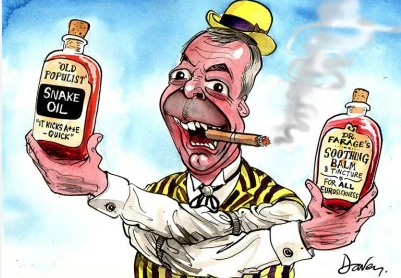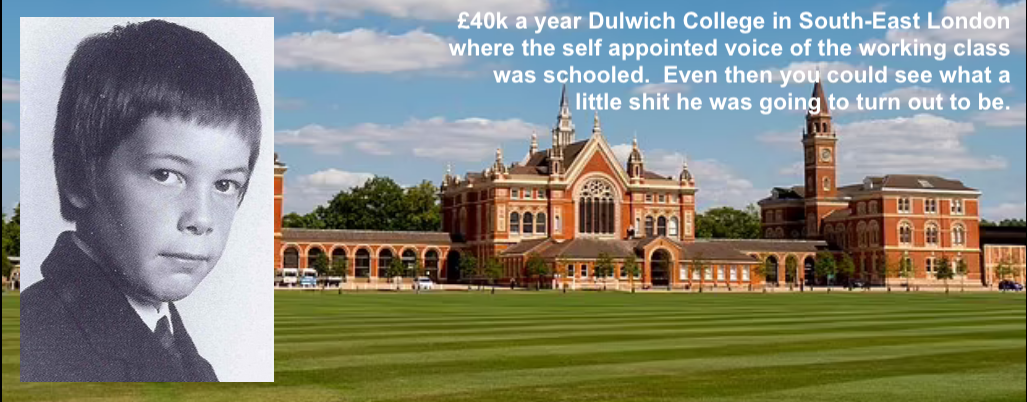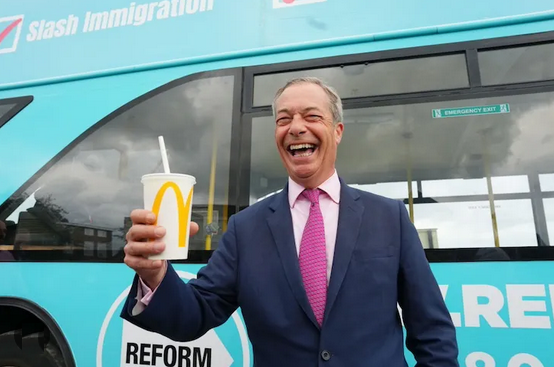Making Scams for Nigel

Beer swilling, fag smoking man of the people Nigel Farage has been slithering through British politics for far too long now. Someone who should have long ago assigned him to the dustbin of politics where he belongs. His latest snake oil scam is Reform UK Ltd, which it need to be pointed out every single time it is mentioned, is not a political movement. It's literally a limited company making money for its shareholders and not accountable to the electorate. It is a political sideshow dressed up as a national emergency. Of course, you’d think it was a major party judging by the way British media hurls microphones at its every belch. Despite polling figures that barely graze the electoral threshold in many regions, the BBC, ITV, and print press fall over themselves to give Reform airtime, treating Farage and his merry band of anti-everything opportunists like they’re the official opposition instead of a swivel-eyed branded rage outlet run by disgruntled millionaires. Every time Richard Tice or Farage stirs the culture war soup, some desperate producer sticks them on a panel next to serious policymakers, granting legitimacy to a group whose 'policies' are mostly vibes, slogans, and xenophobia. It’s not journalism, it’s amplification. And in a post-truth age, that kind of uncritical exposure isn’t harmless; it’s democratic malpractice. These people stirring the shit and should be made to lick the spoon. And as we have seen from over the pond - it's dangerous.
Nigel Farage is a political arsonist turned professional patriot, a man who wrapped himself in the Union Jack while setting fire to the very fabric of the country he claimed to love. The bloke who took one look at Britain’s future and said, ‘What if we drove it off a cliff, called it independence, and blamed immigrants for the crash?’ He claims to support fishermen and farmers but a collective amnesia seems to forget what the Brexit he midwifed did to them. As we saw with the Great British National Strike, which he had his paws all over, he is the curator of the cunt farm and has a very loud silent majority fuelled by algorithms and pints in Wetherspoons.
The frog faced Führage loves to play the role of the blokey everyman, the smiley pub-friendly truth-teller raging against the establishment. It's bullshit. Peel back the carefully staged Wetherspoons backdrop and what do you find? A man who is the establishment. Or at least, that part of the establishment that used to run the City of London on cigars and cronyism.
Born in Kent in 1964 to a stockbroker father and a well-heeled family, Farage didn’t exactly claw his way out of poverty. He was educated at Dulwich College, at £40k a year, one of Britain’s most elite private schools, where he learned two things: how to read Latin and how to look down on anyone who didn’t. Dulwich wasn’t the sort of place that churned out working-class heroes, it was and is a finishing school for the future elite. And how did this self styled working-class man of the people start his career? As a City commodities trader, obviously. Farage spent years in the financial sector making money from markets while railing against the very European regulations that were designed to keep bankers like him from running riot. He didn’t just benefit from the system, he was the system: white, male, rich, and unregulated. The irony is so thick you could bottle it and sell it to GBeebies viewers as patriot juice.

Then somewhere between trading metals and sipping rivers of Chateauneuf-du-Pape, Farage decided the real enemy wasn’t the financial elite: it was the migrants, the Brussels bureaucrats, and the liberal intelligentsia. Because if there’s one thing the British hard right excels at, it’s punching down while pretending to punch up. So he repackaged himself, not as a trust-funded Dulwich boy who thrived under Thatcher, but as the beer-guzzling rebel sticking it to the establishment from inside the Westminster bubble.
Let’s say what it is: It’s a con. A slick, oily, snake-oil drenched pinstriped con designed to hoodwink the hard of thinking.
He pretends to hate the elite while sharing their table. He rails against career politicians while having run for office more times than most people update their passports. And he loves to whine about media bias, yet spends his career being platformed, first by the BBC, then by Russia Today, LBC, and now by the clown car that is GBeebies.
Nigel Farage isn’t an outsider. He’s an insider who cosplays as a rebel, profiting from outrage, sowing division, and dressing up privilege as populism. The only thing working-class about him is the audience he manipulates, exploits, and discards the second the cameras stop rolling.
Farage isn’t a patriot. He’s a traitor in a striped tie, selling off Britain's stability to the highest bidder while smugly toasting the wreckage with a warm pint and a smirk. He birthed BREXIT, but the control he claimed we were taking back didn't happen. Instead of taking back control, he rolled it in shit handed it straight to chaos, making sure his mates shorted the pound in the process.
And then there’s Russia, our friendly neighbourhood dictatorship that Farage seems oddly fond of. You know, the one that coincidentally shared his dream of a broken, divided Europe. The same Russia that unleashed an army of bots, trolls, and disinformation during the Brexit referendum1, amplifying every anti-EU, nationalist, race-baiting message they could find. Who benefited? The Kremlin. And Farage. One sowed division to weaken Europe; the other cashed in on the rubble. Farage has appeared repeatedly on RT (Russia Today)2, Vladimir Putin’s state-funded propaganda outlet. He’s used that platform to attack the EU and praise nationalist policies, offering a convenient British face for authoritarian cheerleading. And then there’s Arron Banks, Farage’s closest financial backer and the man who donated millions to the Leave campaign. Banks had multiple undisclosed meetings with Russian officials3 and was offered lucrative business deals while simultaneously pouring money into Brexit. The UK’s Electoral Commission and National Crime Agency both investigated the source of his funds4, and the UK Intelligence and Security Committee’s Russia Report in 2020 noted the government's failure to investigate Kremlin interference seriously5.
Did Farage know? At best, he looked away. At worst, he was complicit.
So, what Farage did was he helped hand Britain to foreign influence while pretending to liberate it. He stood by as hostile powers amplified division, and when warned about Russian meddling, he scoffed. When journalist Carole Cadwalladr broke stories linking Russian disinformation to Brexit6, Farage labelled them ‘conspiracies’ never once grappling with the sheer gravity of what was unfolding.
We need to dissect his role in destroying the country. Because that is exactly what he has done. Yes our political model is piss poor and yes we have never had equality in the law or a level playing field. For all that ‘pull yourselves up by your bootstraps’ crap, his sort will always ensure that the ladder is firmly pulled up and the very people he claims to represent will always be disadvantaged.

1. Support for Brexit and Its Consequences:
- Farage’s Role in Brexit:
Farage was one of the leading figures behind the Brexit movement, advocating for the UK to leave the European Union. His UKIP (United Kingdom Independence Party) and later the Brexit Party were central in pushing the agenda for an independent UK. For many of his supporters, this is seen as a patriotic effort to reclaim national sovereignty and reduce the power of Brussels over British laws and governance. - Accusations of Disregard for National Unity:
However, many critics argue that Farage’s actions, particularly his support for Brexit, have harmed the UK's unity. The Brexit referendum and its aftermath led to significant political division, economic uncertainty, and social friction. Critics argue that Farage, driven by ideological motives, failed to properly consider the long-term consequences of Brexit on the UK’s relationships with its neighbours, its economy, and its international standing. - Claims of National Betrayal:
Those who view Farage as a “traitor” often argue that his actions, and the Brexit campaign in general, left the UK in a weaker position globally. They contend that the decision to leave the EU was not in the best interests of most UK citizens, especially considering the negative economic and political consequences, such as disruption to trade, jobs, and security cooperation. For them, Farage is seen as prioritizing personal ambition and ideology over the nation’s well-being.
2. Farage’s Alleged Ties to Russia and Other Foreign Influences:
- Suspected Russian Links:
Farage has faced criticism for his connections with individuals and media outlets linked to Russia, such as his appearances on RT (Russia Today) and his relationship with Arron Banks, a key Brexit donor who met with Russian officials. While Farage denies any inappropriate connections, critics argue that these associations raise questions about his true motivations, particularly regarding whether he was being influenced by foreign powers like Russia. - Support for Putin and Russia's Interests:
Farage has previously expressed admiration for Vladimir Putin and Russia’s strongman approach to governance, calling him one of the world’s most admirable leaders. His views on Russia and its geopolitical ambitions have drawn accusations of him being sympathetic to Russian interests, which critics argue could be seen as betraying UK and Western interests.
3. Nationalism and Patriotism:
- Farage’s Populism:
Farage is often hailed by his supporters as a patriot and a defender of British sovereignty. He has positioned himself as a champion of the working-class people who feel disconnected from the elite political establishment. His political rhetoric often focuses on nationalism, patriotism, and sovereignty, which many view as part of a broader populist agenda. - Accusations of Nationalism for Personal Gain:
On the other hand, detractors argue that Farage’s brand of nationalism is self-serving. Critics point to his close ties with wealthy donors, his media career, and his financial gains following Brexit. For them, Farage’s actions seem less about true patriotism and more about advancing his personal political career and the interests of wealthy elites, especially those who benefited from Brexit.
4. Farage’s Public Persona vs. His Actions:
- Patriot or Opportunist?
Farage often frames himself as a defender of Britain’s best interests, someone who seeks to “take back control” from the EU and safeguard British values. But his critics view him as an opportunist who leveraged the Brexit movement to further his own political agenda and financial success. They argue that his Brexit crusade has caused more harm than good, leading to a divided nation and a weakened global position. - Betrayal of Public Trust:
Some see Farage’s persistent promotion of Brexit, despite the economic and political fallout, as a form of betrayal of the public trust. They argue that, by pushing an agenda that many believe has harmed the UK’s stability, Farage has prioritised his personal beliefs and political legacy over the country’s long-term interests.

Whether Farage is a ‘traitor’ or a ‘patriot ultimately comes down to your perspective on Brexit and the national consequences of leaving the EU. For some people Farage embodies the spirit of British independence, standing against an overreaching European bureaucracy and advocating for national sovereignty. For others, his actions are seen as reckless, divisive, and self-serving, leading to claims of betrayal. The debate over his role in Brexit, his connections to Russia, and his broader political legacy will likely continue for years to come, with strong arguments on both sides of the issue, although very few of his supporters can back up their position with actual facts.
And of course Farage’s magnum opus, Brexit, has turned out exactly as expected by those who weren’t blinded by blue passports and nostalgia: a clusterfuck, a diplomatic mess, an economic drag, and a cultural rift. British exports to the EU fell7. The Northern Ireland Protocol created a political and logistical nightmare8. Skilled worker shortages and price hikes hammered key industries9. As for Nigel? Well he was busy shouting at statues and stirring up ‘woke panic’ on GBeebies. He doesn’t care. He got what he wanted: relevance, attention, and a personal brand built on division. The man who once cried about ‘elites’ became the populist mouthpiece of every oligarch and demagogue with a grudge against democracy. Farage’s version of patriotism is a fraud. It’s nationalism for hire, populism for profit, and sovereignty sold to the highest foreign bidder. The only flag he truly salutes is the one flying above the studio lights and donor accounts that keep his media circus alive.
Farage didn’t just lie to Britain, he helped deliver it into the hands of its enemies. He mocked concerns about Russian influence, parroted Kremlin talking points, and rode a wave of misinformation straight into Brexit victory. He didn’t just abandon the truth; he actively obscured it. And now that the consequences are visible to everyone: economic pain, social division, international embarrassment, he’s busy pretending it was all worth it. If patriotism means dismantling your own country while high-fiving foreign adversaries, then yes, Nigel Farage is a patriot. But for anyone who values truth, sovereignty, and democracy, Farage is not a leader he’s the Judas who made sure his 30 pieces of silver went straight to an offshore bank account.

Five go a bit Fash. Not Enid Blyton's finest hour
Reform UK Ltd is not just a fringe outfit with bad ideas, it’s a dangerous political operation masquerading as common sense. Beneath the faux-populist slogans and made-for-TV rants lies a cocktail of hard-right nationalism, climate denial, anti-migrant rhetoric, and anti-democratic impulses, all delivered with corporate polish and a smirk. What makes them truly dangerous isn’t just their ideology, there's nothing new there, Farage isn't called a poundshop Mosley or a wannabe Enoch for nothing, it’s the platform they’re given by a media ecosystem desperate for controversy and clickbait. Despite polling below the Lib Dems in many areas, Reform is wildly over-represented on TV panels, radio shows, and newspaper columns, treated as a legitimate 'alternative voice' while far more constructive movements are ignored. This relentless over-platforming launders their extremism into mainstream discourse, making the unacceptable seem reasonable and the hateful sound 'refreshingly honest'. It’s not balance, it’s complicity. And unless media outlets stop normalising this nonsense and the public starts calling it out for what it is, Reform UK Ltd won’t just shift the conversation, they’ll drag it into the gutter.
If there is any justice, and there sadly probably isn’t, Farage should be held to account for his betrayal of Britain. But of course his sort never are, are they?
- Digital, Culture, Media and Sport Committee – Disinformation and ‘fake news’: Final Report, UK Parliament, 2019. ↩
- “Nigel Farage appears on Russian state media RT,” The Guardian, 2014–2018. ↩
- “Revealed: Leave.EU campaign’s links with Russia,” The Observer / Carole Cadwalladr, 2017. ↩
- “Arron Banks: Brexit donor referred to National Crime Agency,” BBC News, 2018. ↩
- Russia Report, UK Intelligence and Security Committee, 2020. ↩
- Carole Cadwalladr’s TED Talk & Guardian Investigations into Brexit, Facebook, and Russia. ↩
- “UK exports to EU fall significantly post-Brexit,” Office for National Statistics, 2021. ↩
- “Northern Ireland Protocol and the Brexit Border Crisis,” Financial Times, 2021. ↩
- “UK labour shortages worsen post-Brexit,” The Economist, 2022. ↩
The world has gone mad. If you enjoyed reading this, please feel free to look at the rest of the blogs on www.TetleysTLDR.com. They're free to view, there's no paywall, they aren't monetised and I won't ask you to buy me a coffee. Also please free to share anything you find of interest, we only get the message out if people are aware of it. Just a leftie, standing in front of another leftie, asking to be read. All the best, Tetley

